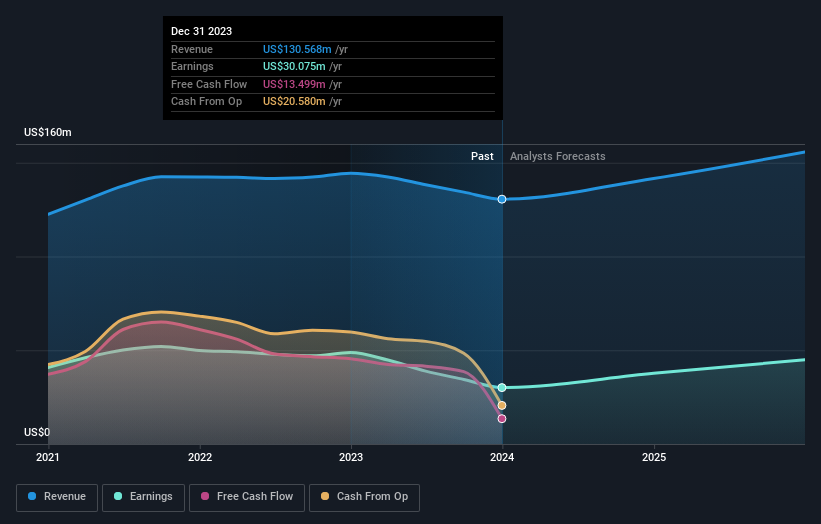Institutions own 37% of Arrow Financial Corporation (NASDAQ:AROW) shares but individual investors control 50% of the company
Key Insights
Significant control over Arrow Financial by individual investors implies that the general public has more power to influence management and governance-related decisions
A total of 25 investors have a majority stake in the company with 43% ownership
If you want to know who really controls Arrow Financial Corporation (NASDAQ:AROW), then you'll have to look at the makeup of its share registry. We can see that individual investors own the lion's share in the company with 50% ownership. Put another way, the group faces the maximum upside potential (or downside risk).
Meanwhile, institutions make up 37% of the company’s shareholders. Generally speaking, as a company grows, institutions will increase their ownership. Conversely, insiders often decrease their ownership over time.
Let's delve deeper into each type of owner of Arrow Financial, beginning with the chart below.
Check out our latest analysis for Arrow Financial
What Does The Institutional Ownership Tell Us About Arrow Financial?
Many institutions measure their performance against an index that approximates the local market. So they usually pay more attention to companies that are included in major indices.
Arrow Financial already has institutions on the share registry. Indeed, they own a respectable stake in the company. This implies the analysts working for those institutions have looked at the stock and they like it. But just like anyone else, they could be wrong. If multiple institutions change their view on a stock at the same time, you could see the share price drop fast. It's therefore worth looking at Arrow Financial's earnings history below. Of course, the future is what really matters.
We note that hedge funds don't have a meaningful investment in Arrow Financial. Looking at our data, we can see that the largest shareholder is Glens Falls National Bank and Trust Company with 10% of shares outstanding. BlackRock, Inc. is the second largest shareholder owning 7.6% of common stock, and The Vanguard Group, Inc. holds about 4.7% of the company stock.
Our studies suggest that the top 25 shareholders collectively control less than half of the company's shares, meaning that the company's shares are widely disseminated and there is no dominant shareholder.
While it makes sense to study institutional ownership data for a company, it also makes sense to study analyst sentiments to know which way the wind is blowing. There is some analyst coverage of the stock, but it could still become more well known, with time.
Insider Ownership Of Arrow Financial
While the precise definition of an insider can be subjective, almost everyone considers board members to be insiders. The company management answer to the board and the latter should represent the interests of shareholders. Notably, sometimes top-level managers are on the board themselves.
Most consider insider ownership a positive because it can indicate the board is well aligned with other shareholders. However, on some occasions too much power is concentrated within this group.
Our most recent data indicates that insiders own some shares in Arrow Financial Corporation. In their own names, insiders own US$9.8m worth of stock in the US$387m company. This shows at least some alignment. You can click here to see if those insiders have been buying or selling.
General Public Ownership
The general public -- including retail investors -- own 50% of Arrow Financial. This size of ownership gives investors from the general public some collective power. They can and probably do influence decisions on executive compensation, dividend policies and proposed business acquisitions.
Private Company Ownership
It seems that Private Companies own 10%, of the Arrow Financial stock. It might be worth looking deeper into this. If related parties, such as insiders, have an interest in one of these private companies, that should be disclosed in the annual report. Private companies may also have a strategic interest in the company.
Next Steps:
I find it very interesting to look at who exactly owns a company. But to truly gain insight, we need to consider other information, too. Consider for instance, the ever-present spectre of investment risk. We've identified 1 warning sign with Arrow Financial , and understanding them should be part of your investment process.
If you would prefer discover what analysts are predicting in terms of future growth, do not miss this free report on analyst forecasts.
NB: Figures in this article are calculated using data from the last twelve months, which refer to the 12-month period ending on the last date of the month the financial statement is dated. This may not be consistent with full year annual report figures.
Have feedback on this article? Concerned about the content? Get in touch with us directly. Alternatively, email editorial-team (at) simplywallst.com.
This article by Simply Wall St is general in nature. We provide commentary based on historical data and analyst forecasts only using an unbiased methodology and our articles are not intended to be financial advice. It does not constitute a recommendation to buy or sell any stock, and does not take account of your objectives, or your financial situation. We aim to bring you long-term focused analysis driven by fundamental data. Note that our analysis may not factor in the latest price-sensitive company announcements or qualitative material. Simply Wall St has no position in any stocks mentioned.

 Yahoo Finance
Yahoo Finance 

